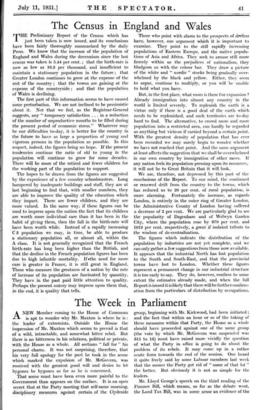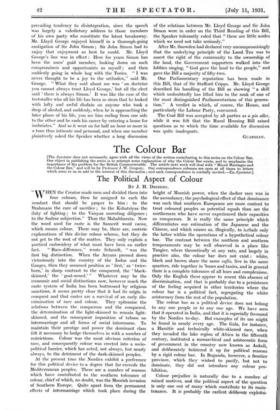The Week in Parliament
ANEW Member coming to the House of Commons is apt to wonder why Mr. Maxton is where he is : the leader of extremists. Outside the House the impression of Mr. Maxton which seems to prevail is that of a wild, intractable, and somewhat bitter rebel. But there is no bitterness in his relations, political or, private, with the House as a whole. All sections "fall for" his personal charm. It was not surprising, therefore, that his very full apology for the part, he took in the scene which marked the expulsion of Mr. McGovern, was received with the greatest good_ will and desire to let bygones be bygones so far as he is concerned.
That scene must have been even more painful to the Government than appears on the surface. It is an open secret that at the Party meeting that self-same morning, disciplinary measures against certain of the Clydeside group, beginning with Mr. Kirkwood, had been initiated ; and the fact that within an .hour or so of the taking of these measures within that Party, the House as a whole should have proceeded against one of the same group (the vote by which Mr, McGovern was suspended was 815 to 16) must have raised more vividly the question of what the Party in office is going to do about the problem of its rebels. It may come up in 0. rather acute form towards the end of the session. One heard it quite freely said by some Labour members last week that the sooner the Party got rid of "some of that lot" the better. But obviously it is not so simple for the leaders.
'Mr. Lloyd George's speech on the third reading of the ,Finance Bill, which means, so far as the debate went, the Land Tax Bill, was in Some sense an evidence of the prevailing tendency to disintegration, since the speech was largely a valedictory address to those members of his own party who constitute the latest breakaway. Mr. Lloyd George enjoyed himself in a thorough-going castigation of Sir John Simon ; Sir John Simon had to enjoy that enjoyment as best he could. Mr. Lloyd George's line was in effect : Here for years Simon has been the unco' guid member, looking down on such compromisers and opportunists as myself ; and then suddenly going in whole hog with the Tories. "I was never thought to be a joy to the orthodox," said Mr. George. "What they said about me was 'on doctrine you cannot always trust Lloyd George,' but all the elect said 'there is always Simon.' It was like the case of the teetotaller who all his life has been so stern that he looked with lofty and awful disdain on anyone who took a drop of alcohol, and suddenly, when he is approaching the later phase of his life, you see him reeling from one side to the other and he ends his career by entering a home for inebriates." And so it went on for half an hour or more in a tone thus intimate and personal, and when one member plaintively asked the Speaker whether a long discussion of the relations between Mr. Lloyd George and Sir John Simon were in order on the Third Reading of this Bill, the Speaker tolerantly ruled that •" these are little asides which we need not take seriously."
• After Mr. Snowden had declared very uncompromisingly that the underlying principle of the Land, Tax was to assert the right of the community to the ownership of the land, the Government supporters walked into the lobbies singing, "God gave the land to the people," and gave the Bill a majority of fifty-two.
One Parliamentary, reputation has been made in this Bill, that of Sir Stafford Cripps. Mr. Lloyd George described his handling of the Bill as showing "a skill which undoubtedly has lifted him to the rank of one of the most distinguished Parliamentarians of this genera- tion." A verdict in which, of course, the House, and particularly the Labour Party, concurred.
The Coal Bill was accepted by all parties as a pis aller, while it was felt that the Rural Housing Bill raised questions as to which the time available for discussion was quite inadequate.
GUARDIAN.



































 Previous page
Previous page